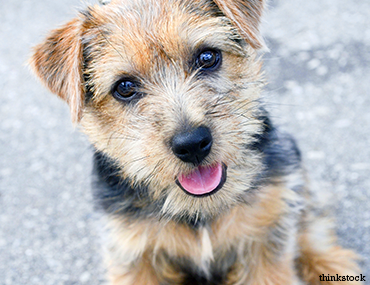Background
The Norfolk Terrier, an English native, was developed to be a barnyard ratter and to remove vermin from the den during hunting excursions. The Norfolk was grouped with the Norwich Terrier for a long time and they are still closely related. The most obvious difference between the breeds now is the ears. The Nor(FOL)k has a (FOL)ded ear, whereas the Nor(WICH) has ears that point up like a witch’s hat.
The Norfolk and Norwich weren’t separated until 1964 when they became recognized as two separate varieties by England’s Kennel Club. In 1979 the American Kennel Club made the same separation.
Sizing up
- Weight: 11 to 12 lbs.
- Height: 9 to 10 inches
- Coat: Double, rough, wiry topcoat with a soft undercoat
- Color: Red, wheaten, black and tan, or grizzle
- Life expectancy: 12 to 15 years
What’s the Norfolk Terrier like?
The Norfolk Terrier is a lively, curious, and loving dog who adores anyone and (most) anything. He loves meeting new people and is great with children as well as other pets. He does enjoy a good hunt so small critters including birds, rodents, and rabbits are not safe.
The Norfolk requires a moderate amount of exercise.
When it comes to training, the Norfolk Terrier can be a quite stubborn so you should start as early as possible. In addition to socialization, be stern but never harsh and always use positive reinforcements when he’s done something correctly.
Grooming your Norfolk Terrier should be simple; brush his hair weekly or as needed to remove dead hairs and mats.
Health
The Norfolk Terrier is generally a healthy breed. Health concerns include the following:
Patellar Luxation
- A knee condition where one or both kneecaps can accidentally slip out of place
Mitral Valve Disease (MVD)
- A condition that occurs when the mitral valve of the heart weakens and can no longer close properly causing blood to leak back into the left atrium which can lead to heart failure
- A heart muscle disease that is indicated by an enlarged heart that isn’t functioning properly that can eventually lead to congestive heart failure (CHF)
Takeaway points
- The Norfolk Terrier is easy to groom.
- The Norfolk Terrier makes a great family dog!
- The Norfolk Terrier would be happy as a city dog, or in the country.
- The Norfolk Terrier would not be a good breed to consider if you work long hours or spend a minimal amount of time at home.
If you have any questions or concerns, you should always visit or call your veterinarian -- they are your best resource to ensure the health and well-being of your pets.
![]()
